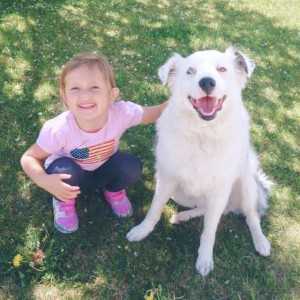Tolerance vs. Enjoyment
Dogs hold such a special place in our heart and in most cases, are treated as another member of the family. According to the APPA – 37-47% of households in the United States own at least one dog. That adds up to about 70-80 million canines living with us as our domesticated buddies. Amazing relationships can form from dog-handler bonds and even link to assisting in lowering blood pressure, heart disease, and weight gain to name a few. We understandably desire to show them our love and gratitude through human affection (ex: hugs and kisses), however, this is where we are potentially forcing the dog into an uncomfortable encounter.
Many of my clients are convinced their dog adores being hugged and kissed. I don’t doubt their dog cares for them deeply, however, I am confident they are often experiencing a tolerated behavior from their best buddy. This type of affection is not natural behavior for our dogs, and in some cases, can seem more threatening then heartfelt. Wrapping your arms around the dog’s jugular, flashing your pearly whites, or throwing your face into theirs are some examples of body language disconnect between humans and canines.
In my past post The Simplicity of Dog Psychology in Dog Training, I discuss how dogs view the word in two simple ways – familiar and unfamiliar. In other words, they are either relaxed or tense. I bring this up to further explain why some dogs do wonderful with certain interactions around those they know – and can then act out in aggression when tested the same way with someone new. It is never a good idea to assume that just because you are a “dog person”, you can approach and handle all pooches the same way. Give each and every dog the respect they deserve and never force an interaction on them!
I have recently started educating children on dog body language and appropriate ways to approach a dog (either one they know or one they are meeting for the first time). By teaching our children the differences between human and dog behavior, we can potentially help save lives of both around the world due to preventable negative encounters.
Please do not misunderstand this post to be an “anti-love your dog” campaign. Dogs, like people, have different personalities and different levels of tolerance. Some absolutely adore their owner’s touch and feel comfortable being “loved on” by just about anyone. All I ask is that you respect and pay attention to your dog’s body language. Any level of tension signifies some level of discomfort with the encounter.
Remember that our dog’s read our body language and NOT OUR INTENT!
Happy Training :)
